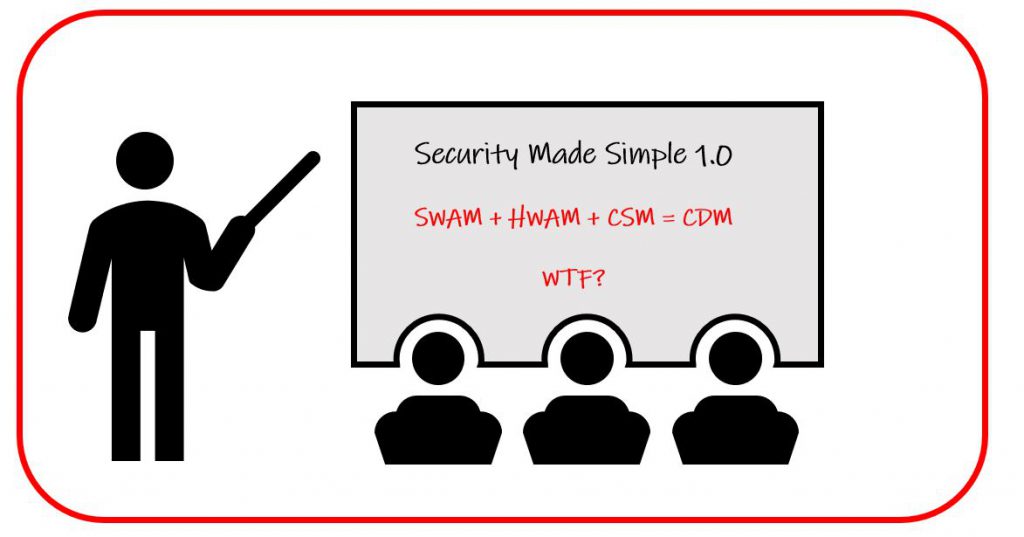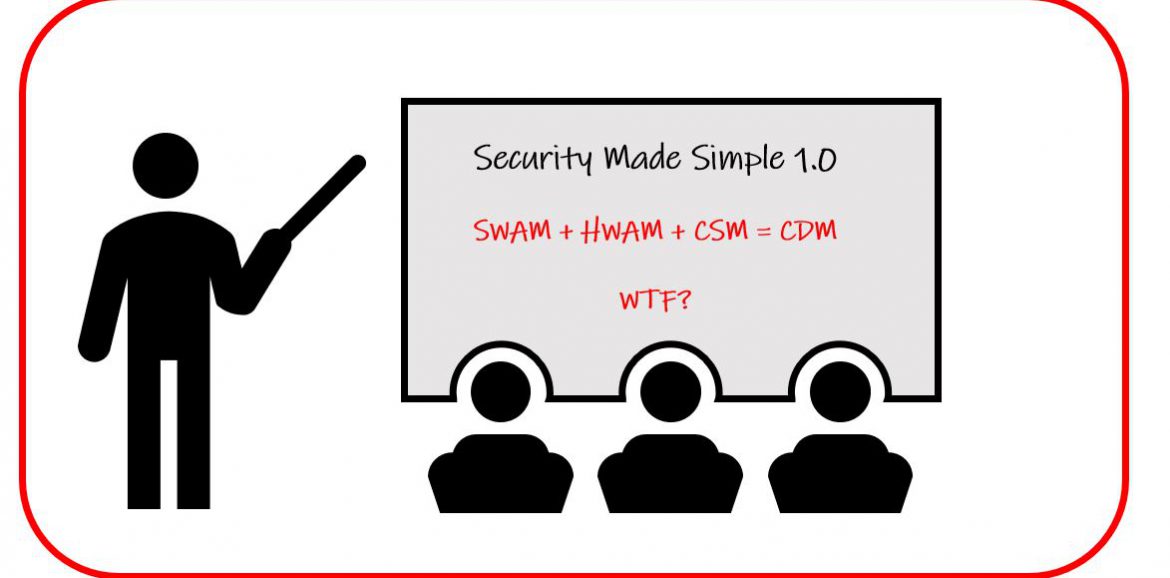
One thing I love about being an instructor is being able to explain things. That kind of goes with the territory. However, it’s relatively easy to explain things when you have experience of the subject matter, know your target audience and possibly have had the question before. That all comes with experience.
However, the real test for an instructor is being able to answer the ‘stupid question’ that comes from so far left field that you weren’t expecting it. Or questions about technology, terminology or jargon that you have not heard of. Admittedly they are few and far between but you have to be on your toes in a classroom as apparently there is no such thing as a ‘stupid question’. Although I am fairly certain that I have heard a few.
I honestly admit that sometimes I have problems remembering all the jargon and abbreviations we are now facing in IT (touché).
Technical concepts I can cope with and if it is a subject which I am either not familiar with or have little experience – in my spare time, I get familiar with it or actively find a situation which will give me the experience. Build it, break it, fix it, tweak it, learn it, teach it and repeat. That way not only do you learn it – you also remember it.
Networking protocols, port numbers, cable lengths, frequencies – all day long. These are necessary evils that need to be taught, learned and put into practice as they are the bread and butter of networking. Once you have used them for a while it all becomes common place.
I love training police officers who come into the class on a Monday morning full of knowledge. Knowledge that they don’t even know they possess. These students are top of their game across a wide cross section of skills, experiences and general knowledge which makes them a pleasure to work with. They can talk all day long about investigations, dealing with public disorder, laws, dogs, helicopters and handcuffs.
But give them the OSI reference model on a Monday morning and watch them turn to stone.
Police officers who deal with cyber crime or cyber-enabled criminal activities need to know the basics. Police officers who deal with investigations, forensics and analysis need to have a good knowledge of the workings of an IT system and supporting network for obvious reasons. So hitting them with a load of abbreviations, numbers, models, bits and bytes on day one has a negative impact. And in a lot of cases you can lose your team within the first module.
It’s important that when you put a course together – you self-critique it and then get it sanity checked to make sure it is a) technically sound and b) makes sense. If you write something – you generally know what the meaning is but a fresh pair of eyes might not understand it.
A trainer friend of mine is very good with the ‘so what does that mean to me?’ delivery. And once a general concept is delivered, he brings it back into the real world with an example, demonstration or case which the new knowledge can be used in. We make a good double-act. I do the tech and Steve does the ‘so what’.
By the end of the week we have them all talking about Layer 3, Layer 2 and Multi-Layer Network Devices like it was language that they had been using since birth. There is no better feeling – however this is capped by the fact that not only do they know what they are talking about – they also know what they are doing and how they are going to use this new-found knowledge to catch criminals. That’s a remarkable feeling.
Throughout my working life – I have met with the wonderful world of abbreviations, codewords, terminology and trigraphs which have made life awkward. For those of us old enough to remember old telegraphic and wireless communication systems will know all about International Q and Z codes. It is possible to have a complete conversation using a series of letters and numbers. ‘INT QRK K’ ‘How do you receive me – over?’
These days of course its all about LOL, BFF and 🙂 .
It took months of training and years of practice to get Q and Z Codes in my head. (I am still learning the language of texting to my kids!)
Spin forwards to 2021 and here I am reviewing courseware for the Systems Security Certified Practitioner (SSCP) course. It’s a great course and a fantastic credential no doubt.
However here is a sentence in the early part of the course:
“HWAM supports SWAM, CSM and VUL. Since HWAM is the first step in proper execution of Continuous Diagnostics and Mitigation (CDM), HWAM must be implemented before the other capabilities can be executed.”
WTF?!
Luckily the abbreviations were expanded in pages previously and so it’s not a complete mystery as to what these sentences say. What they mean however is a little more difficult. Out of context – it would probably be impossible to decipher what this means (unless you are into Asset Management).
The one true abbreviation I love is KISS – ‘Keep It Simple Stupid’. Why do we constantly make life difficult for ourselves by creating new terms and abbreviations which are simply replacing stuff that has been around for years? I accept that a lot of this is not new but we continue to reinvent the wheel – either to make ourselves look clever or more unique from somebody/something that is doing the same thing.
I might start to incorporate my own abbreviations:
- DHCP – TWITS (Tool With IP To Send)
- DNS – SUCKS (Server Updates Clients Knowledge of Sites)
- Windows Server Update Services – although this is Technology Which Automatically Tweaks, I will probably keep this one as WSUS.
My point is that I appreciate the fact that we need abbreviations and jargon for the technologies we encounter. But let’s make sure that are able to translate the jargon into simple terms (KISS).
If you come on one of my classes you will often hear me say – “I know what it stands for – but what does it do or mean?” That helps to learn it. Try it yourself. Imagine that you were talking to someone who was completely new to IT and define the following:
- A Computer
- Internet
- Smart Device
- Malware (Virus, Worm, Trojan)
Don’t Google the terms. Write down a couple of sentences and then see if you can find a dictionary definition or a standard definition and … POW! Welcome to my world. If you can do it easily fantastic, if you can’t – think about how this would come across if you were explaining to a client, customer or user of your system about why or how they needed to do something or what has gone wrong.
This is a crucial part of User Training and Awareness sessions.
Enrich your sessions with the latest technology and jargon, empower your users by explaining what this all means to them and always KISS. (Remember to wear a mask and keep your distance!)







